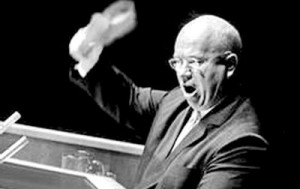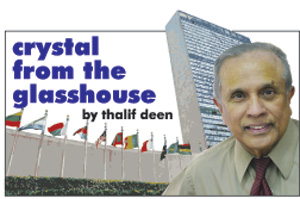Sunday Times 2
The day a Soviet leader banged his shoe at the UN
View(s):UNITED NATIONS — During the height of the Cold War between the United States and the Soviet Union, and particularly in the 1960s, the United Nations was the ideological battle ground where the Americans and the Soviets pummeled each other– metaphorically speaking — either on the floor of the cavernous General Assembly hall or at the horse-shoe table of the Security Council.

A photogrpah showing Khrushev banging his shoe on the podium while delivering his 1960 speech at the United Nations General Assembly. The photo in circulation was dismissed by some as a fake concocted by US intelligence – and that was long before the age of digital technology and photo-shopping. The picture on right shows the official picture
Perhaps one of the most memorable war of words took place in October 1962 when the politically-feisty US Ambassador Adlai Stevenson challenged Soviet envoy Valerian Zorin over allegations that the USSR, perhaps under cover of darkness, had moved nuclear missiles into Cuba—and within annihilating distance of the United States.
Speaking at a tense Security Council meeting, Stevenson admonished Zorin: “I remind you that you didn’t deny the existence of these weapons. Instead, we heard that they had suddenly become defensive weapons. But today — again, if I heard you correctly — you now say they don’t exist, or that we haven’t proved they exist, with another fine flood of rhetorical scorn.”
“All right sir”, said Stevenson, “let me ask you one simple question. Do you, Ambassador Zorin, deny that the USSR has placed and is placing medium and intermediate range missiles and sites in Cuba?”
“Yes or no? Don’t wait for the translation: yes or no?”, Stevenson insisted with a tone of implied arrogance.
Speaking in Russian through a UN translator (who faithfully translated the US envoy’s sentiments into English), Zorin shot back: “I am not in an American courtroom, sir, and therefore I do not wish to answer a question that is put to me in the fashion in which a prosecutor does. In due course, sir, you will have your reply. Do not worry.”
Not to be outwitted, Stevenson howled back: “You are in the court of world opinion right now, and you can answer yes or no. You have denied that they exist. I want to know if …I’ve understood you correctly.” When Zorin said he will provide the answer in “due course”, Stevenson famously declared: “I am prepared to wait for my answer until hell freezes over.”
 An equally memorable Soviet-US confrontation took place at the General Assembly hall in October 1960, but this time it was between the USSR and the Philippines, considered a close US ally at that time. The Filipino delegate Lorenzo Sumulong, lashed out at the USSR, pointing out that “the peoples of Eastern Europe and elsewhere (under Soviet domination) have been deprived of the free exercise of their civil and political rights and which have been swallowed up, so to speak, by the Soviet Union”.
An equally memorable Soviet-US confrontation took place at the General Assembly hall in October 1960, but this time it was between the USSR and the Philippines, considered a close US ally at that time. The Filipino delegate Lorenzo Sumulong, lashed out at the USSR, pointing out that “the peoples of Eastern Europe and elsewhere (under Soviet domination) have been deprived of the free exercise of their civil and political rights and which have been swallowed up, so to speak, by the Soviet Union”.
Incensed by the remark, the Soviet leader Nikita Khrushchev, who was leading the Soviet delegation, hit back with a vengeance, describing the Filipino as “a jerk, a stooge, and a lackey”, and a “toady of American imperialism” –words that are rarely heard in the General Assembly or the Security Council these days.
Forget the North Korean refrain: “Running Dogs of Imperialism”.
But an equally legendary story was the longstanding rumour that Khrushchev removed his shoe and kept banging on his desk, to be recognised, on a point of order.
According to one rumour, the shoe-banging never happened (and there were no UN photographers or cell phone cameras to record the incident for posterity or for the UN archives). The only evidence was a single photo in circulation, which was dismissed by some as a fake concocted by US intelligence – and that was long before the age of digital technology and photo-shopping.
But according to another unconfirmed rumour, Khrushchev did bang his shoes – but the sole was riddled with holes and the shoe was badly in need of urgent repairs. That was probably an anti-Soviet canard by the US or its allies, who claimed they were witnesses to the incident in the General Assembly hall.
As the Hollywood comedian Grouch Marx once remarked: “Who do you believe? Me. Or your own eyes?”
Both UN anecdotes are worth recalling at a time when another Cold War between Russia (this time, minus the USSR and the Soviet Union) and the United States is simmering in the geopolitical arena.
As a former US Ambassador to Russia, Michael McFaul, said recently US-Russian relations have reached one of their lowest points since the end of the Cold War. The current battle ground is the Security Council where both the Americans and the Russians (and this time joined occasionally by the other veto-wielding member, China) are pounding at each other over Ukraine, Syria, Yemen, Iraq, Israel, the North Atlantic Treaty Organisation (NATO) and North Korea.
The conflicts in the Security Council are reminiscent of the Cold War era when each of the two superpowers were in a relentless battle to protect their allies and safeguard their own national interests at the cost of international peace and security.
The US has remained an eternal saviour of Israel and Russia has prevented all attempts at “regime change” in Syria, a longstanding Soviet ally going back to the days of President Hafez al-Assad, the father of the current embattled President, Bashar al-Assad, whom the Americans want ousted from power.
In recent years, the Security Council has remained deadlocked because Russia has used its veto power on four occasions to block resolutions on Syria, including one resolution aimed at taking Syria before the International Criminal Court (ICC) for alleged war crimes.
Having annexed Crimea, Russia has also forestalled US action on Ukraine, leaving the Security Council in limbo.
Samantha Power, the US permanent representative to the UN, told the London Guardian last year: “It’s a Darwinian universe here.”
“If a particular body reveals itself to be dysfunctional, then people are going to go elsewhere,” she said, “And if that happened for more than Syria and Ukraine and you started to see across the board paralysis … it would certainly jeopardise the Security Council’s status and credibility and its function as a go-to international security arbiter. It would definitely jeopardise that over time.”
Meanwhile, the recent hacking of emails inside the offices of the Democratic National Committee, has been attributed to the Russians thereby escalating the threat of a Cold War even further.While US intelligence has confirmed the Russian hacking, there is speculation that this was an attempt to embarrass Democratic Party candidate Hillary Clinton and a boost for Republican candidate Donald Trump, both running in the US presidential elections. If true, this will be the first time that Russia (or for that matter any foreign country) has interfered in a US presidential election.
Asked whether the charges were true, Russian Foreign Minister Sergey Lavrov (a former Russian diplomat based in Colombo in the early 1970s) remarked: “I don’t want to use four-letter words”.
And he did not mean: Nyet.
To add fuel to the fire, Trump last month invited Russia to unearth Hillary Clinton’s 30,000 missing emails from her private email server—a suggestion condemned even by his own Republican Party members.
Trump’s bromance – defined as a non-sexual relationship between two men — with Russian President Vladimir Putin has prompted some to jokingly remark that his running mate as Vice President should have been Putin, not Governor Mike Pence of Indiana.
(The writer can be contacted at thalifdeen@aol.com)

